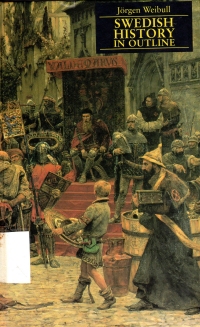 Ever since I read Warriors of the Way (what? Four years ago? Already?), I wanted to read a history of the Finns and the Norse, but I never found anything in the library that fit those needs. Finally, (four years later), I found this book which is almost close enough.
Ever since I read Warriors of the Way (what? Four years ago? Already?), I wanted to read a history of the Finns and the Norse, but I never found anything in the library that fit those needs. Finally, (four years later), I found this book which is almost close enough.
It’s written by a Swedish economist (so I gather), so it comes from a modern political viewpoint which comes through in a couple of ways.
First, the things I learned about Sweden that I think are interesting: First, when the Norse Vikings moved west, the Swedish equivalents went eastward and ended up setting up trade routes and whatnot through the rivers of Russia and the inland seas there all the way to the Middle East. I did not know that. Also, Sweden really punched above its weight in the middle ages, becoming a sort of military superpower that had holdings and almost a bit of empire into the heart of Europe. Unfortunately, the homeland was a small patch of land in a very cold place that could not support a vast army that was not pillaging the rest of Europe, so it faded.
Another thing: In the book The Barrabas Creed, a Swedish prime minister is assassinated. That actually happened. In 1986, the prime minister was indeed killed. My beautiful wife also tells me this is mentioned in the Steig Larsson books. I guess that weighs heavily on the little country.
Something about Sweden that is interesting, and not flattering: it has a studied neutrality to it that it takes as a point of pride, but the book does mention treaties and defensive pacts that Sweden has gotten into throughout the centuries and particularly in the nineteenth and twentieth centuries where its treaty parties get attacked, and Sweden says, “Sucks to be you. We’re neutral.” This continued into the middle of the last century where Sweden wanted to head up a Baltic defensive alliance, and Norway and Denmark said, “Uh, thanks, but we’ll join NATO. Those mongrel Americans tend to honor their commitments.” Or words to that effect.
The book also gave me a bit of insight into the European mindset. Here in the United States, our political system has never, really, had a king. Sure, there was that guy in England way back when, but the transition from monarchy to constitutional republic was relatively quick (yes, I know it was almost fifteen years from the revolution to the Constitution). In Europe, the gradual erosion of the monarch’s authority to the parliament lasted for centuries. That has to affect your outlook and your traditions some.
As a contemporary bit of scholarship, as it is, the book lauds the left political parties and their triumphs in building a welfare state. The author tries to trace when Sweden became Sweden, and it’s not at the height of its military prowess or that. No, Sweden became Sweden in 1920 with the creation of its welfare state. Additionally, the United States is only mentioned a couple of times in the book, and the mentions don’t salute the United States. Basically, we get pegged for creating a world-wide depression in the 1930s and for causing famine when we entered World War I along with a couple other minor offenses to the world order. Well, one could hardly expect a professor to not ding the United States if it was a professor in the United States, so this should be expected. But it’s dings are just little snipes.
At any rate, I was glad to read this book. It’s from a northern European perspective which is different from the England-centric or classical-centric histories I’ve read a bunch of. As this is an “In Outline” book, it’s short and high-level (although the Parliament-loving is lovingly detailed). So I have a smattering now, and if I get a chance to read another like it, I’ll take it. Hopefully something with a bit more popular history in it and a little less political science.
Books mentioned in this review:



Surely Yngwie Malmsteen was worth a chapter or two?
Frankly, that was when Sweden finally became Sweden in my book.
But being a heavy metal god is not as important as being a minister of gender equality.
As memory serves, Sweden did well as a regional power because it had fine infantry and two excellent generals as kings: Gustavus Adolphus and Charles XII.
I didn’t know about their backstabbery. It makes their neutrality less respectable than that of Switzerland.